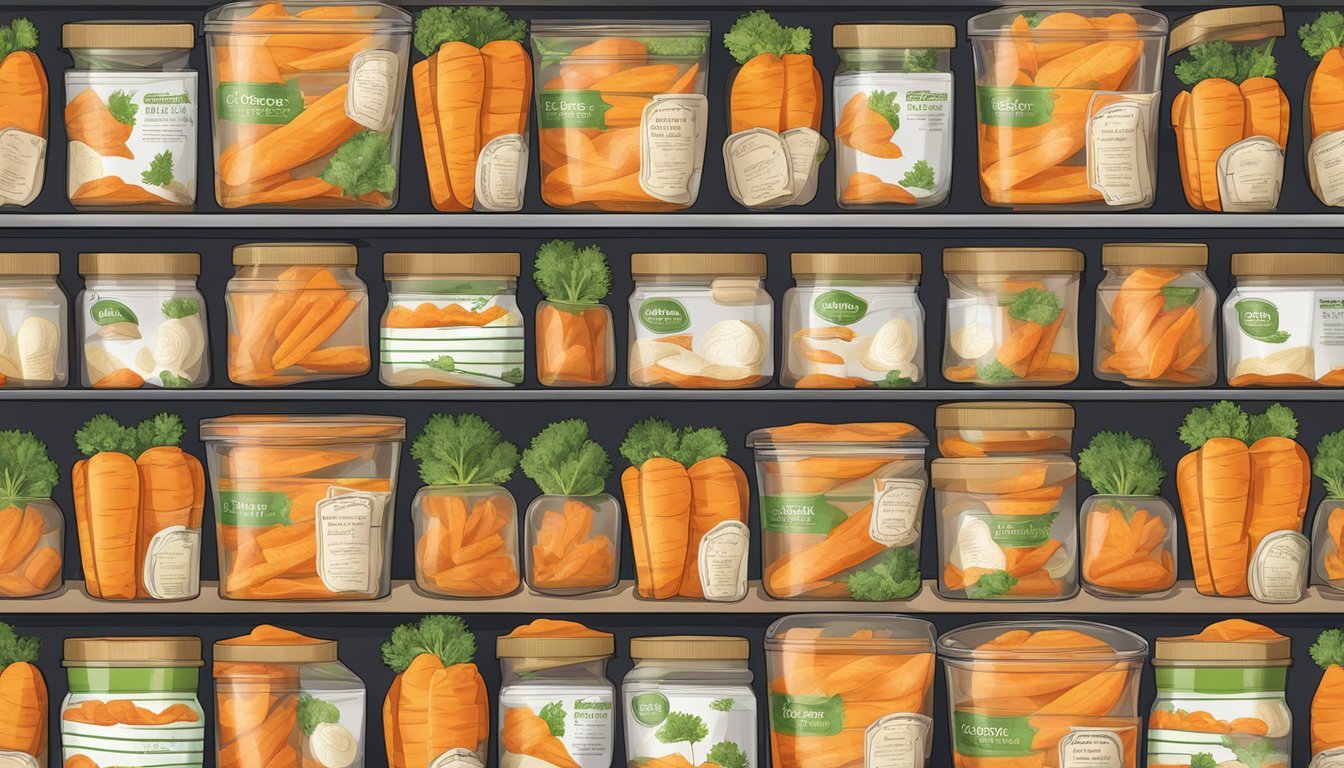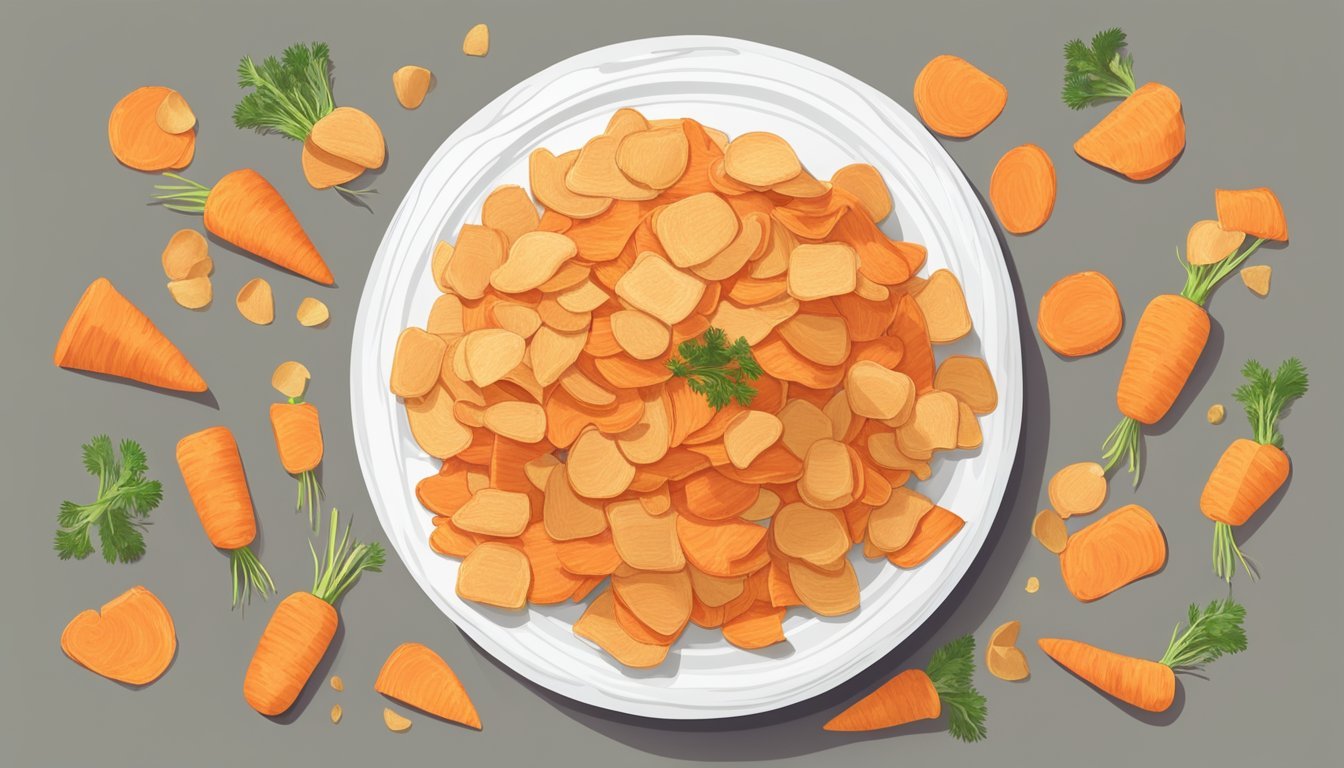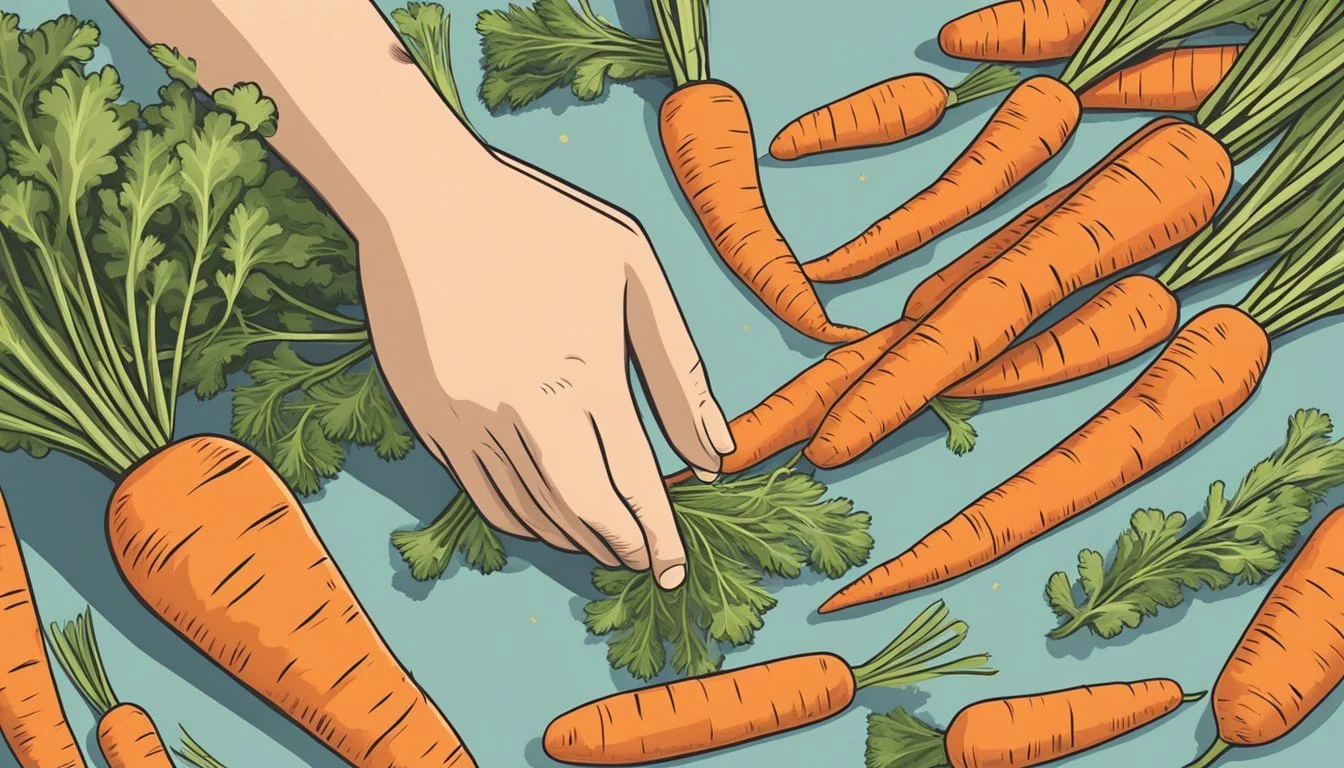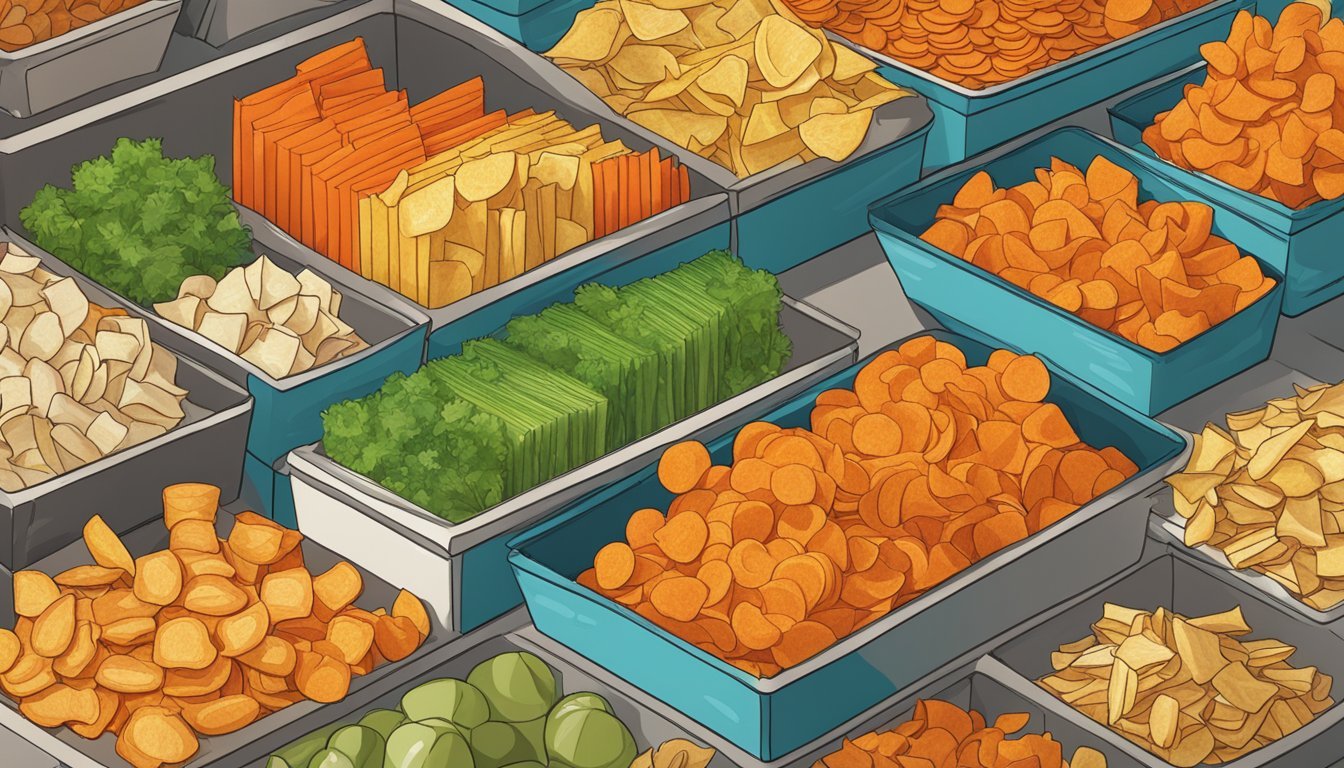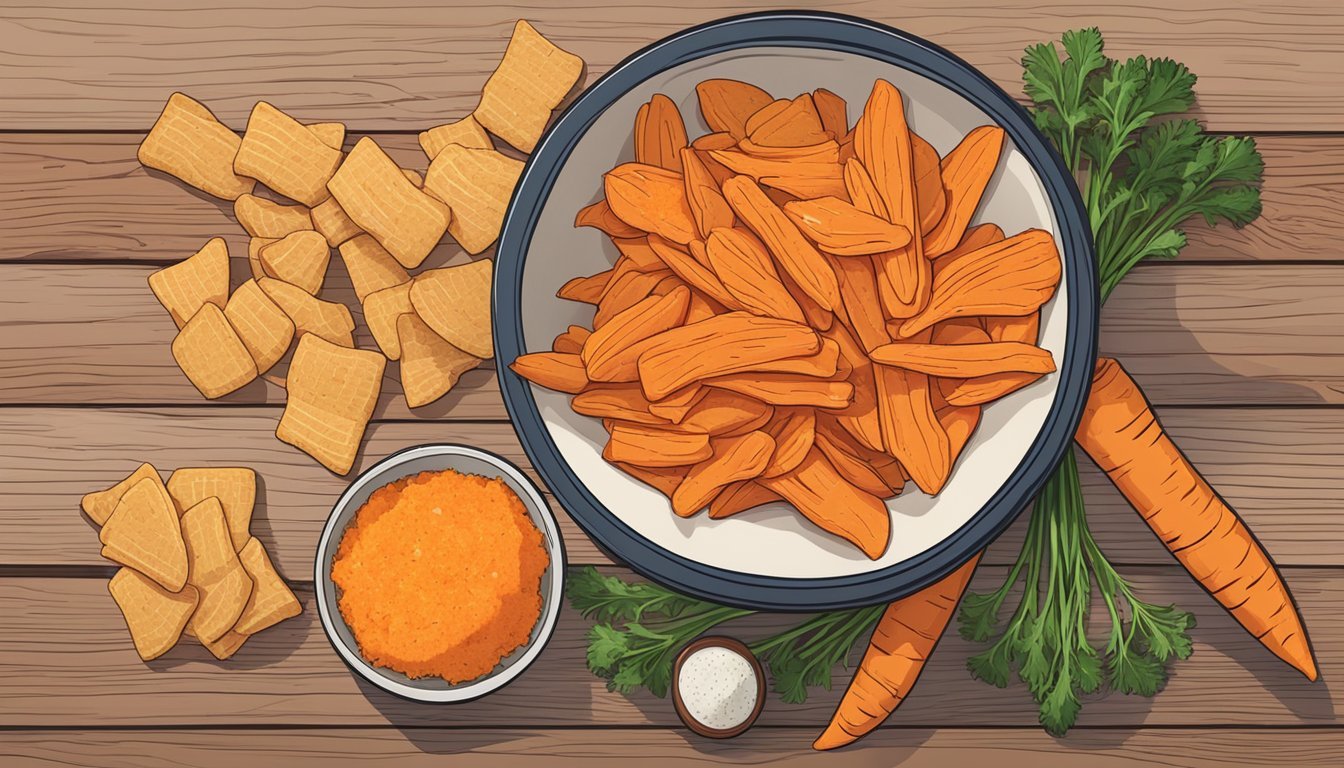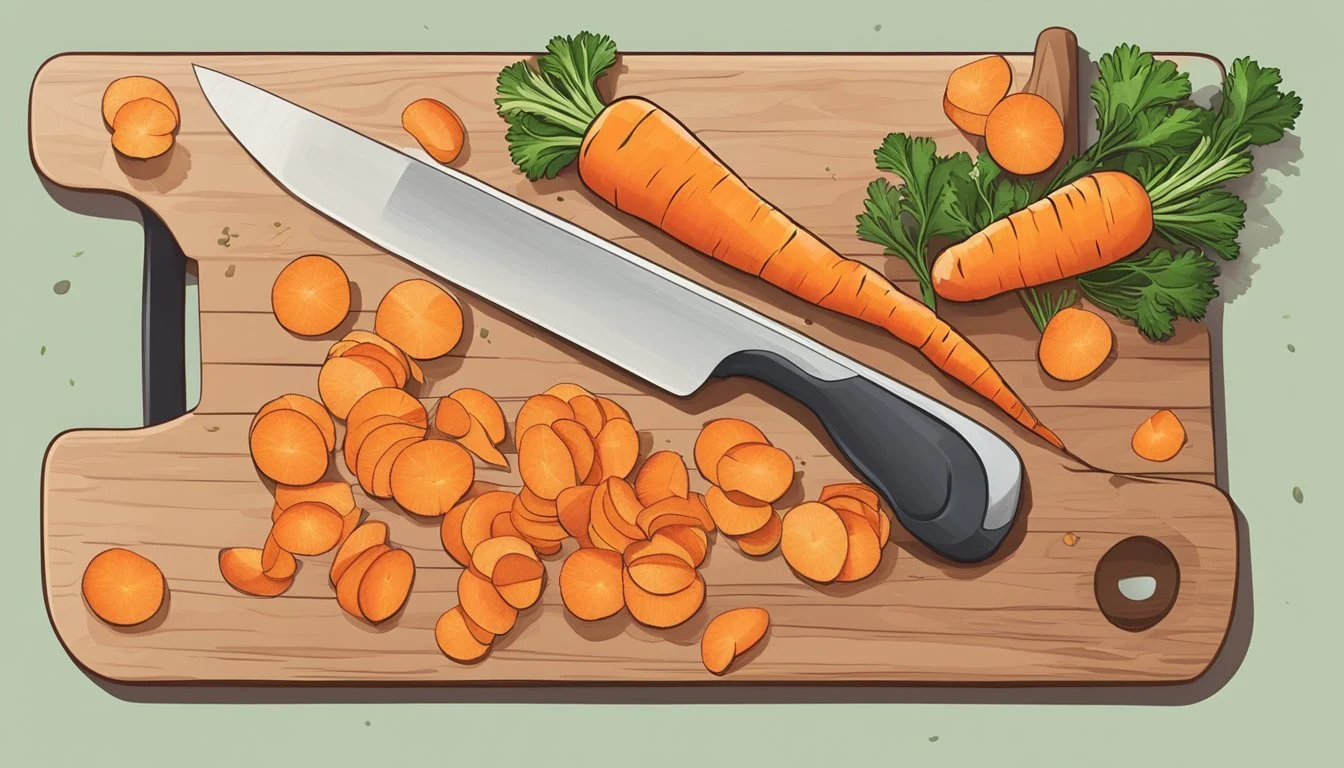How Long Do Carrot Chips Last?
Shelf Life and Storage Tips
Carrot chips, a healthier alternative to traditional snack options, have become a staple for those seeking a nutritious crunch. Their shelf life, like any other snack, is influenced by various factors such as the method of preparation, storage conditions, and whether they are homemade or commercially packaged. Understanding the longevity of carrot chips is essential to maintain their desirable crisp texture and nutritional value.
When stored correctly, homemade carrot chips can last for several days at room temperature and up to two weeks in the refrigerator, given that they are kept in airtight containers to prevent moisture absorption. Commercially packaged carrot chips, with preservatives to extend shelf life, typically have a longer shelf life that can range from a few weeks to a couple of months when unopened. The presence of preservatives and the type of packaging material are key determinants of their expiration date. Even so, it is imperative to follow the "best by" dates provided by manufacturers and to be aware of any changes in texture, taste, or appearance that may indicate spoilage.
Nutritional Value of Carrot Chips
Carrot chips, a healthier alternative to traditional potato chips, are rich in nutrients and provide a substantial amount of essential vitamins and minerals. A typical serving of 35 calories mainly comes from carbohydrates and offers a modest amount of protein.
Nutritional Breakdown:
Calories: 35 per serving
Carbohydrates: 8g (6g net carbs)
Fat: 0g
Protein: 1g
Carrots (how long do carrots last?) are an excellent source of vitamin A, crucial for maintaining good vision, immune function, and healthy skin. They also supply a significant amount of dietary fiber, which aids in digestion and contributes to maintaining a healthy weight.
Vitamins and Minerals:
Vitamin C: Known for its role in immune defense and skin health.
Iron: Essential for blood production and transporting oxygen throughout the body.
Calcium: Vital for strong bones and teeth, as well as muscular function.
Beyond these, carrot chips contain other nutritious compounds like antioxidants, which help protect the body against free radicals. The absence of added fats makes them a lower-calorie and healthier snack choice, suitable for those monitoring their fat intake.
Key Nutrients in Carrot Chips:
High in Vitamin A (more than what is found in potato chips)
Contains Vitamin C, important for overall health
Low in calories and fat, supporting a healthy diet
Delivers dietary fiber to promote satiety and digestive health
This snack option is not only nutritious but also versatile, fitting well into various diets due to its minimal fat content and beneficial nutrients.
Choosing the Right Carrots
When selecting whole carrots for making carrot chips, one should prioritize freshness. Fresh carrots are firm to the touch and have a bright, consistent color. Avoid those that appear rubbery or have developed a white blush, as these signs can indicate age or suboptimal storage conditions.
Before preparing carrot chips, it is vital to ensure the carrots are clean. Washing them under running water is sufficient to remove any dirt. Peeling is not mandatory, but it can remove any residual dirt and improve the aesthetic appeal of the chips.
Large carrots are generally the best choice for chips as they yield more slices and ensure a consistent chip size. Larger carrots also tend to be easier to slice safely. Once clean, wash, and peel the carrots, slice them uniformly to ensure even cooking and crispiness.
Table of Carrot Selection Guidelines:
Attribute What to Look For What to Avoid Freshness Firm, bright appearance Rubberiness, dull color Condition Smooth, undamaged skin White blush, blemishes Size Larger carrots Carrots too small for slicing
After slicing, if one does not plan to cook the carrot slices immediately, store the cut carrots in water to preserve their freshness and crisp texture until ready for use. Correct storage is essential to avoid the slices drying out or becoming limp before they are turned into chips.
Preparation and Cooking Methods
In the creation of carrot chips, the choice of seasoning and cooking technique directly influences the outcome of both flavor and texture. It is essential to select both components thoughtfully to ensure a crispy and delectable snack.
Seasoning Combinations
One can opt for a variety of seasoning combinations to enhance the natural sweetness of the carrots. A simple recipe might include:
Classic: A combination of sea salt (how long does sea salt last?) and cracked black pepper to taste
Savory: Garlic powder, (how long does garlic powder last?) onion powder (how long does onion powder last?), and cumin mixed evenly
Spicy: A bold mix of chili powder and a pinch of cayenne pepper
Herbal: Dried thyme (how long does dried thyme last?) or oregano for an aromatic touch
Sweet: A light sprinkle of cinnamon to complement the carrots' inherent sugars
Each mixture should be blended with a light coating of olive oil or avocado oil to help the seasonings adhere to the carrot slices before cooking.
Cooking Techniques
Different methods can be utilized to make carrot chips, each contributing to the snack's crispiness:
Baking: Preheat the oven to 300°F (150°C). Carrot slices should be arranged in a single layer on a parchment-lined baking sheet and baked until crisp, typically for about 30 minutes, with a flip halfway through to ensure even cooking.
Air Frying: Set the air fryer to 170 degrees and cook the seasoned carrot slices for 18-22 minutes. The chips should be shaken every five minutes to promote even crisping, and overcrowding should be avoided.
The key to achieving the perfect crispness lies in thinly slicing the carrots and making sure they are dry before seasoning and cooking. Regardless of the cooking method, carrot chips are considered done when they are crisp and slightly browned on the edges. This simple, easy approach to cooking can satisfy the craving for a crunchy snack in a healthier way.
Proper Storage for Carrot Chips
Proper storage for carrot chips maximizes both their freshness and longevity. The method of storage differs based on the duration and the form in which the carrots are stored—either fresh, cooked, or dehydrated.
Short-Term Storage
For short-term storage of carrot chips, the key is maintaining their crispness. Carrot chips should be kept in an airtight container to prevent moisture from making them soggy. They can be stored in the fridge to preserve their freshness for up to a week. To enhance their lifespan:
Place carrot chips in a single layer to prevent them from sticking together or becoming soggy.
Use a clean, dry airtight container or Ziploc bag to ensure no moisture gets in.
If they begin to dry out, carrot chips can also be stored with a damp paper towel in the container to rehydrate them slightly.
Long-Term Storage
For those wanting to store carrot chips for extended periods, a dehydrator can be used to completely remove moisture, which is the main cause of spoilage. Once dehydrated, carrot chips should be stored as follows:
Cool the dehydrated carrot chips completely before storage to prevent moisture buildup.
Place them in an airtight container or vacuum-sealed bag to maximize shelf life.
Store them in a cool, dark place, such as a pantry or cupboard. This environment will help retain their quality for many months.
Label the container with the date of storage; dehydrated carrot chips can last up to a year if stored correctly.
By following these methods, one can ensure that carrot chips remain fresh and tasty for both immediate and future use.
Health Benefits and Dietary Considerations
Carrot chips are a healthy snack alternative to traditional potato chips and offer a variety of nutritional benefits. They are naturally gluten-free, making them a safe option for individuals with celiac disease or gluten intolerance. The primary health benefits of carrot chips stem from their nutritional content.
Low in Calories: They are a low-calorie food, which can contribute to a healthy weight management plan.
Rich in Dietary Fiber: Carrots provide dietary fiber, which aids in digestion and helps maintain bowel health.
Vitamins and Minerals: Carrot chips are a source of essential vitamins, including beta-carotene (vitamin A), which is important for vision, immune function, and skin health.
Here's a quick nutritional overview:
Nutrient Benefit Dietary Fiber Supports digestion and satiety Beta-carotene Converts to vitamin A; Antioxidant properties Vitamins C & K Immune function and blood clotting Potassium Regulates blood pressure
While carrot chips are a nutritious snack, they should be consumed in moderation as part of a balanced diet. When making carrot chips at home, one should consider the type of oil and amount of salt used, as these can impact the healthfulness of the snack.
Carrot chips can be baked or dehydrated and stored properly to maintain their crispness. As a shelf-stable snack, they offer a convenient option for those seeking a healthier snack on the go. However, the length of time they remain at optimal quality varies, and consumers should be mindful of proper storage to ensure the carrot chips retain their nutritional value and flavor.
Comparison with Other Snacks
Carrot chips, as a snack alternative, offer a healthier option when compared to traditional potato chips. They contain more Vitamin A while offering a similar satisfying crunch. They do not carry the same nutritional density in terms of Vitamin C, Phosphorus, and Iron, which are higher in potato chips. However, when it comes to comparing shelf life, carrot chips tend to have a shorter window of peak freshness due to their lower preservative content and the nature of dehydrated vegetables (how long do dehydrated vegetables last?).
Shelf Life of Various Chips:
Potato Chips: 1-2 months unopened.
Carrot Chips: 1 month unopened.
Kale Chips: 2-3 weeks unopened.
Zucchini Chips: 1 month unopened.
The popularity of vegetable chips, like kale chips, has risen due to their nutritional profile, with kale chips being a rich source of vitamins A, C, and K. However, their shelf life is generally shorter than that of carrot chips, lasting only a few weeks.
Comparatively, zucchini chips align closely with carrot chips in terms of shelf life. Both snacks present a lower calorie count and a higher fiber content than potato chips, making them appealing choices for health-conscious consumers.
It should be noted that the shelf life of these snacks is significantly extended when unopened and stored properly. Once opened, exposure to air, moisture, and light can shorten their freshness span.
In summary, consumers seeking a healthier snack may opt for carrot chips over traditional potato chips due to their vitamin A content and fiber, despite the shorter shelf life and difference in the nutritional profile compared to other snack chips.
Serving Suggestions and Uses
Carrot chips can be a delightful addition to any meal or snack time due to their crisp texture and sweet, earthy flavor. They serve excellently as a side dish alongside sandwiches or burgers, offering a healthier alternative to traditional potato chips. For a burst of flavor, consider pairing the carrot chips with a variety of dips such as hummus, ranch, or a creamy sour cream dip. The robust nature of carrot chips makes them perfect for both casual snacking and inclusion in formal meal settings.
When looking for a crunchy component in soups or stews, chopped carrot chips add not just texture but also an additional layer of delicious taste. Their versatility allows them to complement a wide range of flavors, from the simplest of broths to the most complex of chowders.
Healthy Snacking Options:
Alone, for a light, nutritious snack.
Paired with a bold dip for enhanced satisfaction.
Creative Uses in Meals:
As a side dish to sandwiches, adding a satisfying crunch.
Tossed into soups for texture contrast and flavor enhancement.
For those who enjoy a hint of sweetness in their snacks, consider incorporating slices of apples with carrot chips for a balanced and health-conscious option. The combination offers a mix of both sweet and savory notes, catering to a medley of palates while keeping snacking nutritious and interesting.
Given their extended shelf life when stored appropriately in an airtight container, carrot chips are a convenient go-to snack that can be enjoyed over time without a quick expiration. They maintain their crispness and flavor, making them a reliable and delicious choice for various dietary patterns and culinary explorations.
Common Questions About Carrot Chips
Carrot chips are a popular snack option for those seeking a healthier alternative to traditional potato chips. Understanding their shelf life and safety considerations is essential for enjoying them at their best quality and avoiding potential allergens.
Shelf Life
Homemade Carrot Chips:
Unopened/Sealed: Once baked and stored in an airtight container, they can often last up to two weeks.
Opened/Exposed: They tend to last for about a week if kept in a cool, dry place.
To maximize crispiness, carrot chips should be cut to a consistent thickness and pat dry to remove excess water before baking.
Safety and Allergies
When consuming carrot chips, there are a couple of safety and allergy considerations to keep in mind:
Allergic Reactions: Rarely, individuals may have an allergy to carrots, which could result in an adverse reaction to carrot chips.
Safe Handling: To ensure carrot chips are safe to consume, they should have their tops and ends trimmed before baking, and one should always wash their hands before preparing the chips.
Using this information, consumers can help ensure that their carrot chips are both delicious and safe to enjoy.
Tips for Perfect Carrot Chips
To make perfect carrot chips, starting with the cut of the carrots is crucial. They should be thinly sliced, about 1/4 inch thick for optimal crispiness. Utilize a mandolin slicer for consistent thickness, as a sharp knife may not always achieve uniformity. However, if using a sharp knife, ensure the slices are as even as possible.
Pre-sliced carrots from the store offer convenience but often lack the desired thickness. If using an air fryer, ensure the slices fit comfortably in the air fryer basket without overlapping to allow for even cooking.
Preparation:
Wash carrots thoroughly to remove any dirt.
Dry them well; moisture is the enemy of crispiness.
Slicing:
Use a mandoline slicer for uniform slices.
Alternatively, a sharp knife may be used with careful attention to slice thickness.
Cooking:
Air fryer carrot chips should be cooked in a single layer; batch cooking may be necessary.
Turning halfway through the cooking process ensures even crispiness.
Experiment with cooking times and temperatures. Different air fryers may require slight adjustments to get the perfect crisp.
In the table below, find a quick reference for the perfect carrot chips:
Method Temperature Time Air Fryer 380°F (193°C) 10-15 minutes Oven 425°F (218°C) 10-12 minutes
Remember to monitor the carrot chips closely towards the end of the cooking time to prevent burning. Enjoy your perfect, crispy carrot chips!

